- Home
- Clive Barker
Books Of Blood Vol 4
Books Of Blood Vol 4 Read online
Books Of Blood Vol 4
Clive Barker
Clive Barker
Books Of Blood Vol 4
To Alec and Con
ACKNOWLEDGMENTS
My thanks to: Doug Bennett, who got me into Pentonville-and out again-in the same day and later furnished me with his insights on prisons and the prison service; to Jim Burr, for his mind's eye tour of White Deer, Texas, and for the New York adventures; to Ros Stanwell-Smith, for her enthusiastic detailing of plagues and how to start them; and to Barbara Boote, my tireless editor, whose enthusiasm has proved the best possible spur to invention.
THE INHUMAN CONDITION
ARE YOU the one then?" Red demanded, seizing holdof the derelict by the shoulder of his squalid gabardine.
"What one d'you mean?" the dirt-caked face replied. He was scanning the quartet of young men who'd cornered him with rodent's eyes. The tunnel where they'd found him relieving himself was far from hope of help. They all knew it and so, it seemed, did he. "I don't know what you're talking about."
"You've been showing yourself to children," Red said.
The man shook his head, a dribble of spittle running from his lip into the matted bush of his beard. "I've done nothing," he insisted.
Brendan sauntered across to the man, heavy footsteps hollow in the tunnel. "What's your name?" he inquired, with deceptive courtesy. Though he lacked Red's height and commanding manner, the scar that inscribed Brendan's cheek from temple to jaw line suggested he knew suffering, both in the giving and the receiving. "Name," he demanded. "I'm not going to ask you again."
"Pope," the old man muttered. "Mr. Pope."
Brendan grinned. "Mr. Pope?" he said. "Well, we heard you've been exposing that rancid little prick of yours to innocent children. What do you say to that?"
"No," Pope replied, again shaking his head. "That's not true. I never done nothing like that." When he frowned the filth on his face cracked like crazy paving, a second skin of grime which Was the accrual of many months. Had it not been for the fragrance of alcohol off him, which obscured the worst of his bodily stench, it would have been nigh on impossible to stand within a yard of him. The man was human refuse, a shame to his species.
"Why bother with him?" Karney said. "He stinks."
Red glanced over his shoulder to silence the interruption. At seventeen, Karney was the youngest, and in the quartet's unspoken hierarchy scarcely deserving of an opinion. Recognizing his error, he shut up, leaving Red to return his attention to the vagrant. He pushed Pope back against the wall of the tunnel. The old man expelled a cry as he struck the concrete; it echoed back and forth. Karney, knowing from past experience how the scene would go from here, moved away and studied a gilded cloud of gnats on the edge of the tunnel. Though he enjoyed being with Red and the other two-the camaraderie, the petty larceny, the drinking-this particular game had never been much to his taste. He couldn't see the sport in finding some drunken wreck of a man like Pope and beating what little sense was left in his deranged head out of him. It made Karney feel dirty, and he wanted no part of it.
Red pulled Pope off the wall and spat a stream of abuse into the man's face, then, when he failed to get an adequate response, threw him back against the tunnel a second time, more forcibly than the first, following through by taking the breathless man by both lapels and shaking him until he rattled. Pope threw a panicky glance up and down the track. A railway had once run along this route through Highgate and Finsbury Park. The track was long gone, however, and the site was public parkland, popular with early morning joggers and late-evening lovers Now, in the middle of a clammy afternoon, the track was deserted in both directions.
"Hey," said Catso, "don't break his bottles."
"Right," said Brendan, "we should dig out the drink before we break his head."
At the mention of being robbed of his liquor Pope began to struggle, but his thrashing only served to enrage his captor. Red was in a dirty mood. The day, like most days this Indian summer, had been sticky and dull. Only the dog-end of a wasted season to endure; nothing to do, and no money to spend. Some entertainment had been called for, and it had fallen to Red as lion, and Pope as Christian, to supply it.
"You'll get hurt if you struggle," Red advised the man, "we only want to see what you've got in your pockets."
"None of your business," Pope retorted, and for a moment he spoke as a man who had once been used to being obeyed. The outburst made Karney turn from the gnats and gaze at Pope's emaciated face. Nameless degeneracies had drained it of dignity or vigor, but something remained there, glimmering beneath the dirt. What had the man been, Karney wondered? A banker perhaps? A judge, now lost to the law forever?
Catso had now stepped into the fray to search Pope's clothes, while Red held his prisoner against the tunnel wall by the throat. Pope fought off Catso's unwelcome attentions as best he could, his arms flailing like windmills, his eyes getting progressively wilder. Don't fight, Karney willed him, it'll be worse for you if you do. But the old man seemed to be on the verge of panic. He was letting out small grunts of protest that were more animal than human.
"Somebody hold his arms," Catso said, ducking beneath Pope's attack. Brendan grabbed hold of Pope's wrists and wrenched the man's arms up above his head to facilitate an easier search. Even now, with any hope of release dashed, Pope continued to squirm. He managed to land a solid kick to Red's left shin, for which he received a blow in return. Blood broke from his nose and ran down into his mouth. There was more color where that came from, Karney knew. He'd seen pictures aplenty of spilled people-bright, gleaming coils of guts; yellow fat and purple lungs-all that brilliance was locked up in the gray sack of Pope's body. Why such a thought should occur to him Karney wasn't certain. It distressed him, and he tried to turn his attention back to the gnats, but Pope demanded his attention, loosing a cry of anguish as Catso ripped open one of his several waistcoats to get to the lower layers.
"Bastards!" Pope screeched, not seeming to care that his insults would inevitably earn him further blows. "Take your shifting hands off me or I'll have you dead. All of you I" Red's fist brought an end to the threats, and blood came running after blood. Pope spat it back at his tormentor. "Don't tempt me,"
Pope said, his voice dropping to a murmur. "I warn you..."
"You smell like a dead dog," Brendan said. "Is that what you are: a dead dog?"
Pope didn't grant him a reply. His eyes were on Catso, who was systematically emptying the coat and waistcoat pockets and tossing a pathetic collection of keepsakes into the dust on the tunnel floor.
"Karney," Red snapped, "look through the stuff, will you? See if there's anything worth having."
Karney stared at the plastic trinkets and the soiled ribbons, at the tattered sheets of paper (was the man a poet?) and the wine-bottle corks. "It's all trash," he said.
"Look anyway," Red instructed. "Could be money wrapped in that stuff." Karney made no move to comply. "Look, damn you.
Reluctantly, Karney went down on his haunches and proceeded to sift through the mound of rubbish Catso was still depositing in the dirt. He could see at a glance that there was nothing of value there, though perhaps some of the items-the battered photographs, the all but indecipherable notes-might offer some clue to the man Pope had been before drink and incipient lunacy had driven the memories away. Curious as he was, Karney wished to respect Pope's privacy. It was all the man had left.
"There's nothing here," he announced after a cursory examination. But Catso hadn't finished his search. The deeper he dug the more layers of filthy clothing presented themselves to his eager hands. Pope had more pockets than a master magician.
Karney glanced up from the forlorn heap of belongings and found, to his discomfort, tha
t Pope's eyes were on him. The old man, exhausted and beaten, had given up his protests. He looked pitiful. Karney opened his hands to signify that he had taken nothing from the heap. Pope, by way of reply, offered a tiny nod.
"Got it!" Catso yelled triumphantly. "Got the fucker!" and pulled a bottle of vodka from one of the pockets. Pope was either too feeble to notice that his alcohol supply had been snatched or too tired to care. Whichever way, he made no sound of complaint as the liquor was stolen from him.
"Any more?" Brendan wanted to know. He'd begun to giggle, a high-pitched laugh that signaled his escalating excitement. "Maybe the dog's got more where that came from," he said, letting Pope's hands fall and pushing Catso aside. The latter made no objection to the treatment. He had his bottle and was satisfied. He smashed off the neck to avoid contamination and began to drink, squatting in the dirt. Red relinquished his grip on Pope now that Brendan had taken charge. He was clearly bored with the game. Brendan, on the other hand, was just beginning to get a taste for it.
Red walked over to Karney and turned over the pile of Pope's belongings with the toe of his boot.
"Fucking wash-out," he stated, without feeling.
"Yeah," Karney said, hoping that Red's disaffection would signal an end to the old man's humiliation. But Red had thrown the bone to Brendan, and he knew better than to try and snatch it back. Karney had seen Brendan's capacity for violence before and he had no desire to watch the man at work again. Sighing, he stood up and turned his back on Brendan's activities. The echoes off the tunnel's wall were all too eloquent however, a mingling of punches and breathless obscenities. On past evidence nothing would stop Brendan until his fury was spent. Anyone foolish enough to interrupt him would find themselves victims in their turn.
Red had sauntered across to the far side of the tunnel, lit a cigarette, and was watching the punishment meted out with casual interest. Karney glanced around at Catso. He had descended from squatting to sitting in the dirt, the bottle of vodka between his outstretched legs. He was grinning to himself, deaf to the drool of pleas falling from Pope's broken mouth.
Karney felt sick to his stomach. More to divert his attention from the beating than out of genuine interest, he returned to the junk filched from Pope's pockets and turned it over, picking up one of the photographs to examine. It was of a child, though it was impossible to make any guess as to family resemblance. Pope's face was now barely recognizable; one eye had already begun to close as the bruise around it swelled. Karney tossed the photograph back with the rest of the mementoes. As he did so he caught sight of a length of knotted cord which he had previously passed over. He glanced back up at Pope. The puffed eye was closed, the other seemed sightless. Satisfied that he wasn't being watched, Karney pulled the string from where it lay, coiled like a snake in its nest, among the trash. Knots fascinated him and always had. Though he had never possessed skill with academic puzzles (mathematics was a mystery to him; the intricacies of language the same) he had always had a taste for more tangible riddles. Given a knot, a jigsaw or a railway timetable, he was happily lost to himself for hours. The interest went back to his childhood, which had been solitary. With neither father nor siblings to engage his attention what better companion than a puzzle?
He turned the string over and over, examining the three knots set at inch intervals in the middle of its length. They were large and asymmetrical and seemed to serve no discernible purpose except, perhaps, to infatuate minds like his own. How else to explain their cunning construction except that the knotter had been at pains to create a problem that was well nigh insoluble? He let his fingers play over the surfaces of the knots, instinctively seeking some latitude, but they had been so brilliantly contrived that no needle, however fine, could have been pushed between the intersected strands. The challenge they presented was too appealing to ignore. Again he glanced up at the old man. Brendan had apparently tired of his labors. As Karney looked on he threw the old man against the tunnel wall and let the body sink to the ground. Once there, he let it lie. An unmistakable sewer stench rose from it.
"That was good," Brendan pronounced like a man who had stepped from an invigorating shower. The exercise had raised a sheen of sweat on his ruddy features; he was smiling from ear to ear. "Give me some of that vodka, Catso."
"All gone," Catso slurred, upending the bottle. "Wasn't more than a throatful in it."
"You're a lying shit," Brendan told him, still grinning.
"What if I am?" Catso replied, and tossed the empty bottle away. It smashed. "Help me up," he requested of Brendan. The latter, his great good humor intact, helped Catso to his feet. Red had already started to walk out of the tunnel; the others followed.
"Hey Karney," Catso said over his shoulder, "you coming?"
"Sure."
"You want to kiss the dog better?" Brendan suggested. Catso was almost sick with laughter at the remark. Karney made no answer. He stood up, his eyes glued to the inert figure slumped on the tunnel floor, watching for a flicker of consciousness. There was none that he could see. He glanced after the others. All three had their backs to him as they made their way down the track. Swiftly, Karney pocketed the knots. The theft took moments only. Once the cord was safely out of sight he felt a surge of triumph which was out of all proportion to the goods he'd gained. He was already anticipating the hours of amusement the knots would furnish. Time when he could forget himself, and his emptiness; forget the sterile summer and the loveless winter ahead; forget too the old man lying in his own waste yards from where he stood.
"Karney!" Catso called.
Karney turned his back on Pope and began to walk away from the body and the attendant litter of belongings. A few paces from the edge of the tunnel the old man behind him began to mutter in his delirium. The words were incomprehensible. But by some acoustic trick, the walls of the tunnel multiplied the sound. Pope's voice was thrown back and forth and back again, filling the tunnel with whispers.
Itwasn't until much later that night, when he was sitting alone in his bedroom with his mother weeping in her sleep next door, that Karney had the opportunity to study the knots at leisure. He had said nothing to Red or the others about his stealing the cord. The theft was so minor they would have mocked him for mentioning it. And besides, the knots offered him a personal challenge, one which he would face-and conceivably fail-in private.
After some debate with himself he elected the knot he would first attempt and began to work at it. Almost immediately he lost all sense of time passing; the problem engrossed him utterly. Hours of blissful frustration passed unnoticed as he analyzed the tangle, looking for some clue as to a hidden system in the knotting. He could find none. The configurations, if they had some rationale, were beyond him. All he could hope to do was tackle the problem by trial and error. Dawn was threatening to bring the world to light again when he finally relinquished the cord to snatch a few hours of sleep, and in a night's work he had merely managed to loosen a tiny fraction of the knot.
Over the next four days the problem became an idee fixe, a hermetic obsession to which he would return at any available opportunity, picking at the knot with fingers that were increasingly numb with use. The puzzle enthralled him as little in his adult life ever had. Working at the knot he was deaf and blind to the outside world. Sitting in his lamp-lit room by night, or in the park by day, he could almost feel himself drawn into its snarled heart, his consciousness focused so minutely it could go where light could not. But despite his persistence, the unraveling proved a slow business. Unlike most knots he had encountered, which, once loosened in part, conceded the entire solution, this structure was so adroitly designed that prising one element loose only served to constrict and tighten another. The trick, he began to grasp, was to work on all sides of the knot at an equal rate, loosening one part a fraction then moving around to loosen another to an equal degree, and so on. This systematic rotation, though tedious, gradually showed results.
He saw nothing of Red, Brendan or Catso in this tim
e. Their silence suggested that they mourned his absence as little as he mourned theirs. He was surprised, therefore, when Catso turned up looking for him on Friday evening. He had come with a proposal. He and Brendan had found a house ripe for robbery and wanted Karney as lookout man. He had fulfilled that role twice in the past. Both had been small breaking and entering jobs like this, which on the first occasion had netted a number of salable items of jewelry, and on the second several hundred pounds in cash. This time, however, the job was to be done without Red's involvement. He was increasingly taken up with Anelisa, and she, according to Catso, had made him swear off petty theft and save his talents for something more ambitious. Karney sensed that Catso-and Brendan too, most likely-was itching to prove his criminal proficiency without Red. The house they had chosen was an easy target, so Catso claimed, and Karney would be a damn fool to let a chance of such easy pickings pass by. He nodded along with Catso's enthusiasm, his mind on other pickings. When Catso finally finished his spiel Karney agreed to the job, not for the money, but because saying yes would get him back to the knot soonest.
MUCHlater that evening, at Catso's suggestion, they met to look at the site of the proposed job. The location certainly suggested an easy take. Karney had often walked over the bridge that carried Hornsey Lane across the Archway Road, but he had never noticed the steep footpath-part steps, part track-that ran from the side of the bridge down to the road below. Its entrance was narrow and easily overlooked, and its meandering length was lit by only one lamp, which light was obscured by trees growing in the gardens that backed on to the pathway. It was these gardens-their back fences easily scaled or wrenched down-that offered such perfect access to the houses. A thief, using the secluded footpath, might come and go with impunity, unseen by travelers on either the road above or that below. All the setup required was a lookout on the pathway to warn of the occasional pedestrian who might use the footpath. This would be Karney's duty.

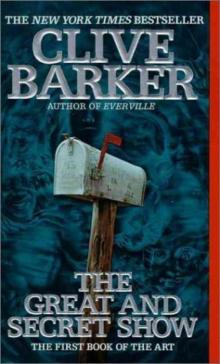 The Great and Secret Show
The Great and Secret Show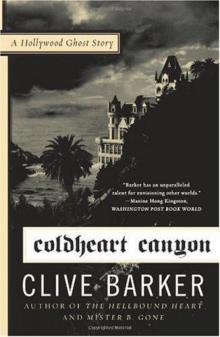 Coldheart Canyon: A Hollywood Ghost Story
Coldheart Canyon: A Hollywood Ghost Story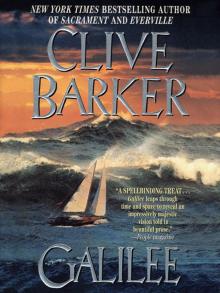 Galilee
Galilee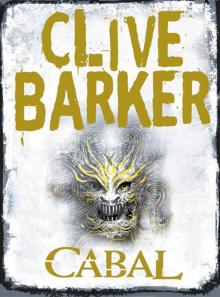 Cabal
Cabal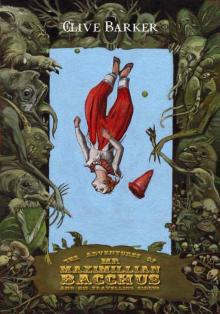 The Adventures of Mr. Maximillian Bacchus and His Travelling Circus
The Adventures of Mr. Maximillian Bacchus and His Travelling Circus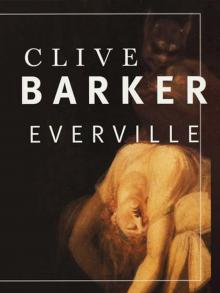 Everville
Everville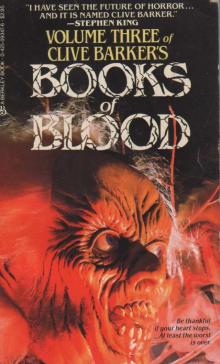 Books of Blood: Volume Three
Books of Blood: Volume Three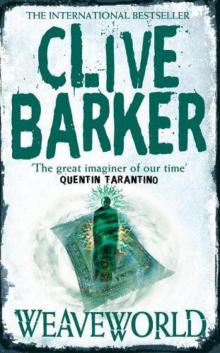 Weaveworld
Weaveworld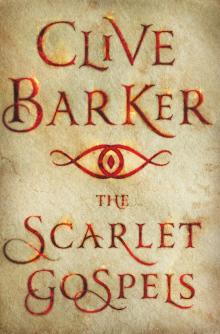 The Scarlet Gospels
The Scarlet Gospels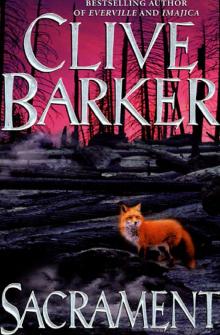 Sacrament
Sacrament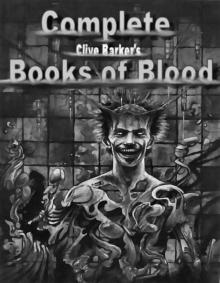 Books of Blood: Volumes 1-6
Books of Blood: Volumes 1-6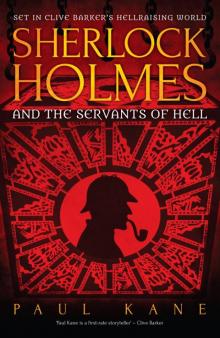 Sherlock Holmes and the Servants of Hell
Sherlock Holmes and the Servants of Hell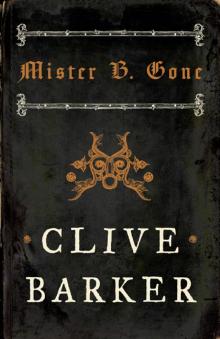 Mister B. Gone
Mister B. Gone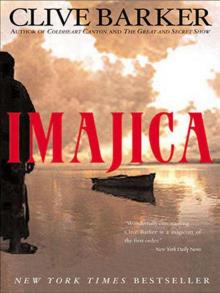 Imajica
Imajica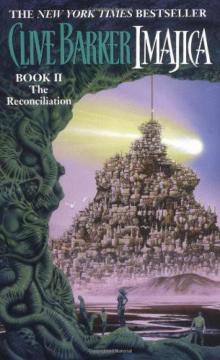 The Reconciliation
The Reconciliation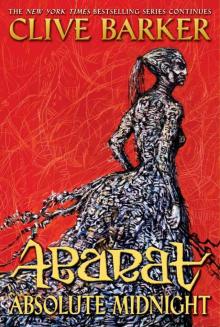 Abarat
Abarat Clive Barker's First Tales
Clive Barker's First Tales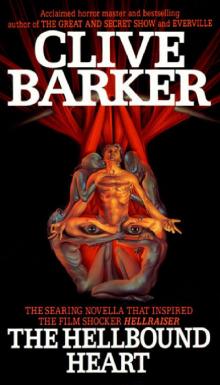 The Hellbound Heart
The Hellbound Heart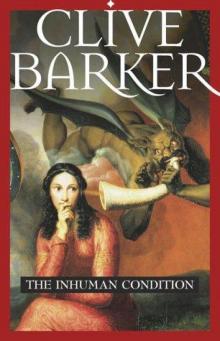 The Inhuman Condition
The Inhuman Condition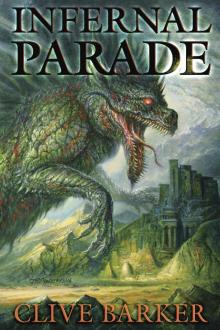 Infernal Parade
Infernal Parade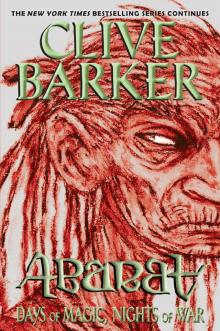 Days of Magic, Nights of War
Days of Magic, Nights of War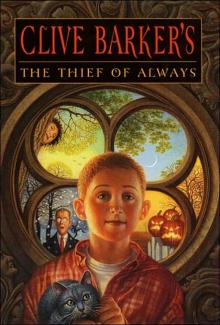 The Thief of Always
The Thief of Always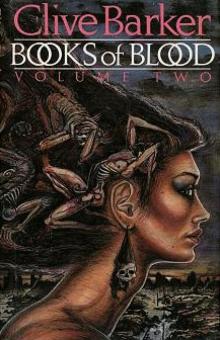 Books of Blood Vol 2
Books of Blood Vol 2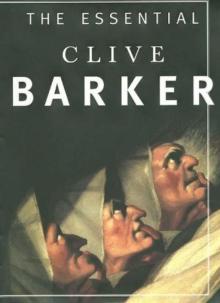 The Essential Clive Barker
The Essential Clive Barker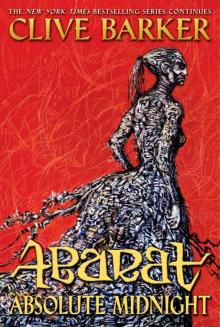 Abarat: Absolute Midnight a-3
Abarat: Absolute Midnight a-3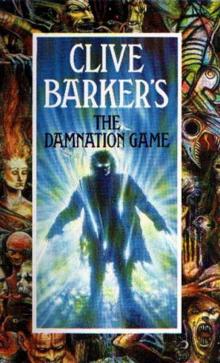 The Damnation Game
The Damnation Game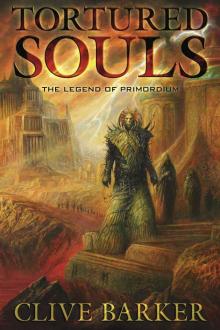 Tortured Souls: The Legend of Primordium
Tortured Souls: The Legend of Primordium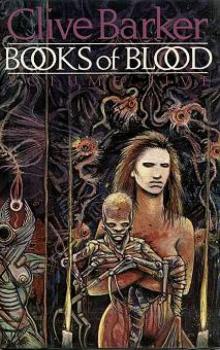 Books of Blood Vol 5
Books of Blood Vol 5 Imajica 02 - The Reconciliator
Imajica 02 - The Reconciliator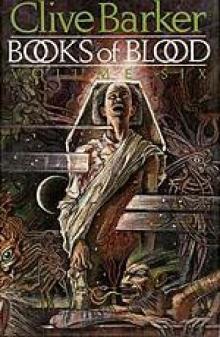 Books Of Blood Vol 6
Books Of Blood Vol 6 Imajica 01 - The Fifth Dominion
Imajica 01 - The Fifth Dominion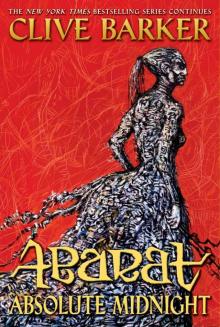 Abarat: Absolute Midnight
Abarat: Absolute Midnight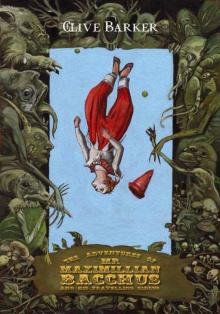 The Adventures of Mr. Maximillian Bacchus & His Traveling Circus
The Adventures of Mr. Maximillian Bacchus & His Traveling Circus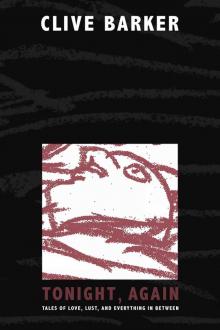 Tonight, Again
Tonight, Again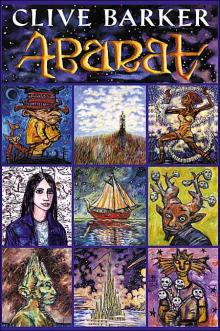 Abarat: The First Book of Hours a-1
Abarat: The First Book of Hours a-1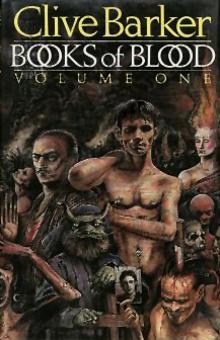 Books Of Blood Vol 1
Books Of Blood Vol 1 Age of Desire
Age of Desire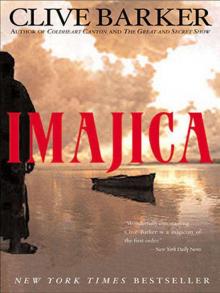 Imajica: Annotated Edition
Imajica: Annotated Edition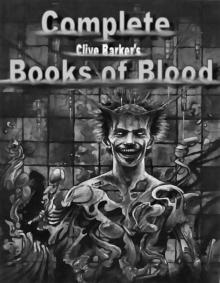 Complete Books of Blood
Complete Books of Blood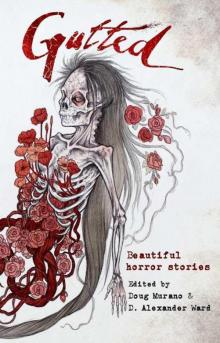 Gutted: Beautiful Horror Stories
Gutted: Beautiful Horror Stories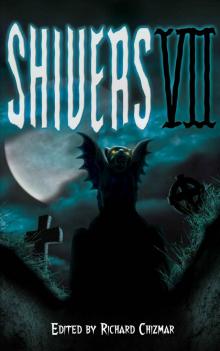 Shivers 7
Shivers 7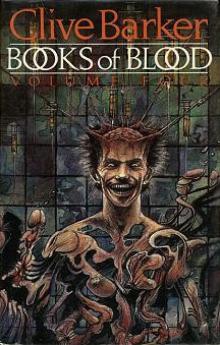 Books Of Blood Vol 4
Books Of Blood Vol 4